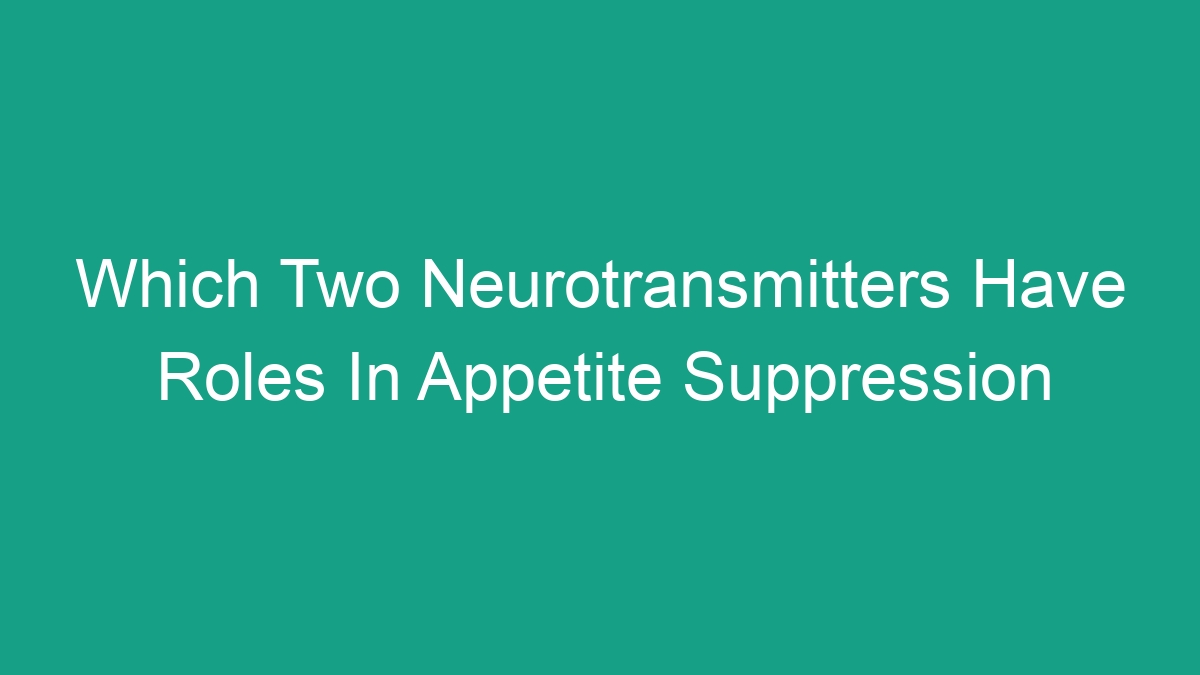
When it comes to managing our appetite, the role of neurotransmitters cannot be overstated. These chemical messengers in the brain play a crucial role in regulating our hunger, satiety, and overall food intake. There are several neurotransmitters involved in appetite regulation, but two in particular stand out for their role in appetite suppression: serotonin and norepinephrine.
Serotonin
Serotonin is a neurotransmitter that is best known for its role in mood regulation, but it also plays a key role in appetite suppression. It is synthesized from the amino acid tryptophan and is found throughout the brain and gastrointestinal system. Serotonin is known to inhibit food intake and has been the target of many appetite-suppressant medications.
How Serotonin Suppresses Appetite
Serotonin exerts its appetite-suppressing effects through several mechanisms:
- Regulation of brain regions: Serotonin influences the activity of brain regions involved in hunger and satiety, such as the hypothalamus and the brainstem. By modulating the activity of these regions, serotonin can help regulate appetite and food intake.
- Control of cravings: Serotonin is involved in regulating cravings for certain types of food, especially those high in carbohydrates. Low serotonin levels have been associated with increased cravings for these types of foods, and increasing serotonin levels can help reduce these cravings.
- Mood regulation: Serotonin not only affects mood but also plays a role in emotional eating. By regulating mood, serotonin can help prevent overeating in response to stress or negative emotions.
Ways to Increase Serotonin Levels
Given the important role of serotonin in appetite suppression, it is important to maintain healthy levels of this neurotransmitter. There are several ways to naturally increase serotonin levels in the brain:
- Diet: Consuming foods rich in tryptophan, such as turkey, eggs, nuts, and seeds, can provide the building blocks for serotonin synthesis.
- Exercise: Regular physical activity has been shown to increase serotonin levels and improve mood, which can help regulate appetite.
- Sunlight: Sunlight exposure triggers the production of serotonin in the brain, so spending time outdoors can help boost serotonin levels.
- Supplements: Certain supplements, such as 5-HTP, can provide a direct precursor to serotonin synthesis and may help increase serotonin levels.
Norepinephrine
Norepinephrine is another neurotransmitter that plays a role in appetite suppression. Also known as noradrenaline, norepinephrine is involved in the body’s “fight or flight” response and is released in response to stress or danger. In addition to its role in the stress response, norepinephrine also contributes to the regulation of appetite.
How Norepinephrine Suppresses Appetite
Norepinephrine influences appetite and food intake through several mechanisms:
- Regulation of energy expenditure: Norepinephrine increases the body’s metabolic rate, leading to increased energy expenditure. This can help to suppress appetite by promoting a feeling of fullness and reducing the drive to eat.
- Impact on food choices: Norepinephrine has been linked to a decreased preference for high-fat and high-sugar foods, which can help regulate overall food intake and prevent overeating.
- Stress response: Norepinephrine is released in response to stress, and it can suppress appetite as part of the body’s natural response to stress and danger.
Ways to Increase Norepinephrine Levels
Boosting norepinephrine levels can help support appetite suppression and weight management. Here are some ways to naturally increase norepinephrine levels in the body:
- Exercise: Regular exercise has been shown to increase norepinephrine levels, especially high-intensity and resistance training.
- Stress management: Engaging in stress-reducing activities such as meditation, yoga, or deep breathing exercises can help regulate norepinephrine levels.
- Certain foods: Foods high in certain nutrients, such as tyrosine and phenylalanine, can support the synthesis of norepinephrine. Examples include lean meats, dairy products, bananas, and avocados.
- Cold exposure: Exposure to cold temperatures can trigger the release of norepinephrine as part of the body’s thermoregulatory response.
Conclusion
Both serotonin and norepinephrine play essential roles in appetite suppression and food intake regulation. Understanding the ways in which these neurotransmitters influence our hunger and satiety can provide valuable insights into strategies for appetite management and weight control. By adopting healthy lifestyle practices that support the natural production and function of these neurotransmitters, individuals can better regulate their appetite and make choices that support overall well-being.
It is important to note that individual responses to neurotransmitter modulation can vary, and any significant changes in diet, exercise, or supplementation should be discussed with a healthcare professional. Seeking personalized advice and guidance can help ensure that any strategies for appetite suppression are safe and effective for individual needs and circumstances.



